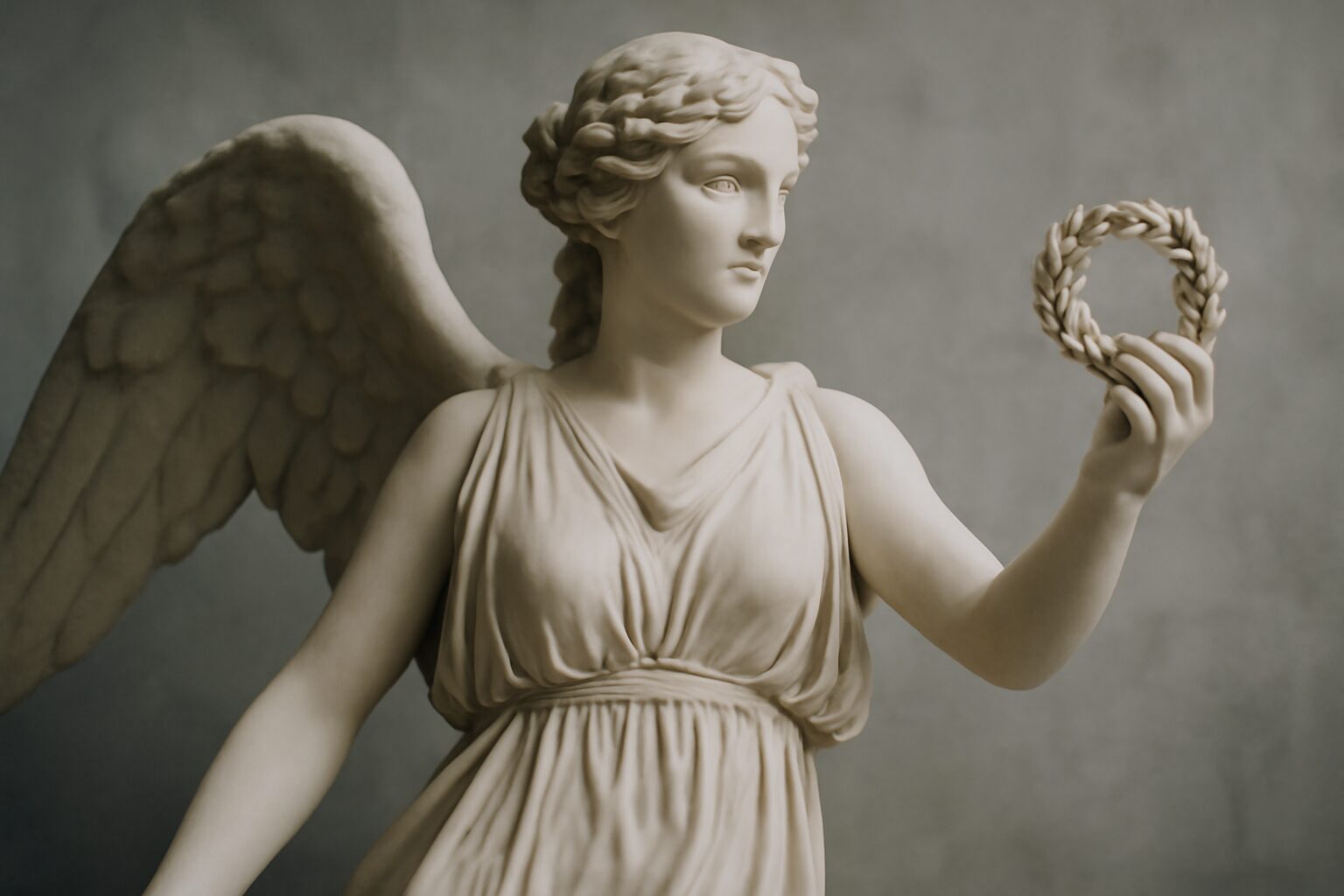Nike: The Winged Goddess of Victory
In Greek mythology, Nike is the divine personification of victory, known for her speed, strength, and triumphant presence. Her name literally means "victory" in Greek, and she was revered by warriors, athletes, and leaders who sought her favor in battle and competition.
Mythology and Origins
Nike was born to the Titan Pallas and the river goddess Styx, making her a sibling to powerful figures like Zelos (Zeal), Kratos (Strength), and Bia (Force). She allied with Zeus during the Titanomachy, the great war between the Olympians and Titans, earning her a place among the gods of Olympus. Her loyalty to Zeus made her one of his closest divine companions, often depicted standing beside him in art and myth.
Powers and Symbolism
Nike was often portrayed as a winged goddess, symbolizing swift and decisive victory. She carried a laurel wreath or palm branch to crown victors, and her presence was believed to tip the scales in favor of those she favored. Unlike Ares, the god of war, Nike represented the glory of triumph rather than the brutality of conflict.
Her influence extended beyond battle—she was also associated with athletic competitions, particularly the Olympic Games, where victors were honored in her name. Temples and statues of Nike, such as the famous Winged Victory of Samothrace, celebrated her as a universal symbol of success.
Relationships and Worship
Nike was closely linked to Zeus and Athena, often serving as their charioteer or companion in myths. In Athens, she was worshiped alongside Athena in the Parthenon, where a smaller temple, the Temple of Athena Nike, was dedicated to her. The Greeks believed that honoring Nike would ensure military and competitive success.
Her legacy endures today—her name and imagery inspire modern brands, sports, and even space missions (NASA's Nike rockets). As a timeless emblem of achievement, Nike remains one of the most recognizable figures from Greek mythology.
Alternative Names for Nike
God Name: Victoria (Roman)
In Roman mythology, Nike is known as Victoria. She is the goddess of victory, equivalent to the Greek Nike, and was worshiped by the Romans in a similar context, often associated with military triumphs and competitions.
God Name: Niku0113 (Greek)
The original Greek name 'Niku0113' (u039du03afu03bau03b7) means 'victory.' She was often depicted in Greek art as a winged goddess, symbolizing swiftness and the fleeting nature of victory.
God Name: Nikephoros (Greek (Epithet))
An epithet meaning 'victory-bringer,' used to describe Nike in contexts where she is seen as bestowing victory upon individuals or cities. This term highlights her role as a divine benefactor of success.
God Name: Nike Apteros (Greek (Cult Title))
A cult title meaning 'wingless victory,' specifically associated with the statue of Nike in the Athenian Acropolis. Unlike typical depictions, this version lacks wings, symbolizing that victory would never leave Athens.
Tales about Nike
Nike and Athena: The Triumph of Wisdom
During the Athena's legendary contest with Poseidon for patronage of Athens, the city’s fate hung in the balance. As the two deities presented their gifts—Athena’s olive tree against Poseidon’s saltwater spring—the air crackled with divine tension. It was then that Nike, sensing the significance of the moment, descended from Olympus, her golden wings casting a brilliant light over the proceedings.
The Moment of Decision
When the Athenian elders declared Athena the victor, recognizing the enduring value of her gift, Nike swept forward. She placed a golden laurel upon Athena’s brow, not merely as a symbol of victory, but as an affirmation that true triumph belongs to wisdom and foresight. From that day forward, Nike became Athena’s constant companion in battle and strategy, ensuring that intellect and justice would always prevail over brute force.
Nike and Zeus: Wings of Destiny
In the epic Zeus' war against the Titans, the outcome was uncertain until Nike intervened at a crucial moment. As Zeus hurled his thunderbolts against the mighty Titan leader, Cronus, Nike flew ahead of the divine lightning, her swiftness guiding each strike true to its mark.
The Turning Tide
When Zeus faced Typhon, the most fearsome of all monsters, it was Nike who bolstered his resolve. She whispered strategies of victory into his ear while evading Typhon’s hundred fiery heads. Her presence turned the tide, and when Zeus finally emerged victorious, he honored Nike by making her his charioteer, declaring that no great victory would ever be complete without her swift wings leading the way.
Frequently Asked Questions
Who is Nike in Greek mythology?
Nike is the Greek goddess of victory, often depicted with wings and associated with both war and peaceful competitions. She symbolizes triumph and success.
What are Daimones in Greek mythology?
Daimones (or spirits) in Greek mythology are minor deities or personifications of concepts like love, fear, or justice. They influence human lives and nature but are less powerful than major gods.
Why is Nike important in Greek culture?
Nike represented the ideal of victory, which was highly valued in ancient Greek culture, especially in athletics and warfare. Her imagery was used to inspire and celebrate achievements.
How do Greek personifications like Nike apply today?
Concepts like Nike (victory) are still relevant today, symbolizing success in sports, business, and personal goals. Many modern brands and symbols draw inspiration from these ancient personifications.
What can we learn from Greek spirits (Daimones)?
Daimones teach us how ancient Greeks explained emotions and natural phenomena through storytelling. They reflect human experiences and the belief that unseen forces shape our lives.













